It is a big year for documentaries at Cannes. Three are in official selection: Marina Zenovich's Roman Polanski: Wanted And Desired, which premiered at Sundance and is screening at the Croisette out of competition, Israeli director Ari Folman's animated film Waltz With Bashir in the Competition, and James Toback's film about boxer Mike Tyson, Tyson, which is in Un Certain Regard.
But the factors that give the above films 'Cannes appeal' say more about the scores of films being made that have little chance at the box office. Look at the subjects: Waltz With Bashir will trade on the novelty value established by its animated antecedent Persepolis, and Polanski is not just a person but an infamous brand, as is Mike Tyson.
If your film does not have a hook, let alone a strong left hook, the odds are very much against you.
The most successful documentaries of the past five years, Fahrenheit 9/11 (which grossed $119m in North America), March Of The Penguins ($77m) and An Inconvenient Truth ($24m), have all had a clear brand and narrative to market.
Last year was not a good one in the recent history of the form. In North America, the largest market for theatrical documentaries, only three films earned more than $1m: Michael Moore's Sicko ($24.5m), Charles Ferguson's No End In Sight ($1.4m) and David Sington's In The Shadow Of The Moon ($1.1m). The next highest-grossing documentary films took south of $600,000.
Mark Urman, head of US distribution at ThinkFilm, predicts 'a more Darwinian' market. 'I used to release documentaries that grossed mid-six figures but I paid nothing for them. When you pay mid-six figures for a film, you have to make that much more money.' And clearly that is not happening.
Urman points to the example of Roman Polanski: Wanted And Desired, one of the early banner sales at Sundance this year. It was picked up for the US not by a theatrical distributor but by broadcaster HBO, with The Weinstein Company acquiring international rights. Such are the signs of a market correction.
Wouter Barendrecht, international sales agent of Fortissimo Films, agrees the peak of the market is long past. 'Now distributors have shifted to a more careful approach.' Worse, there are a growing number of films in the marketplace, fiction and non-fiction, and not enough places to screen them.
The US theatrical market dictates the strength of the theatrical documentary worldwide for the simple reason the US does not have a tradition of television documentary typified by international public broadcasters such as the BBC in the UK. Hence, in the US, documentaries have to be cinematic in the literal sense. For a while, audiences were interested in taking part: from the sophistication of Andrew Jarecki's Capturing The Friedmans ($3.1m in North America) to the folksy populism of Morgan Spurlock's Super Size Me ($11.5m) and Jeffrey Blitz's Spellbound ($5.7m).
Urman suggests those films have spawned many but lesser imitators. What is missing is the sense of event, and that translates around the world.
'Many films are average and shouldn't be features. If you see them on TV, you don't feel imposed on. But they have no place in a cinema. There are so many, it was dragging everyone down; it was hard for good films to distinguish themselves from the others. What was a refreshing alternative to other kinds of (non-fiction) movies is no longer refreshing because there are eight documentaries opening on a weekend.'
Reality TV has lowered the bar of what constitutes a documentary in the mind of the cinema-going public. The ubiquity of roving cameras and grainy images aping the documentary style - not just on television but in feature films such Cloverfield - has blurred definitions of once-standardised terms such as verite and diminished its impact.
'The only concrete market for the moment is television. They buy, they pay you,' says Jan Rofekamp of Montreal-based sales company Films Transit. He paints a stark picture, starker still for feature documentaries. 'From now on, I'm looking for two types of films - TV hours with a short life that you can sell in six months and some arts programming. Only very rarely feature-length. There are almost no more feature slots in prime time. They get bought but no-one sees them because they are shown after midnight.'
For those masochists who must appear on a big screen to feel truly seen, the key will be must-see stories with broad appeal and first-class production values. Urman predicts more documentaries from established fiction directors seeking a less expensive mode in which to practise their craft. Urman cites the example of Toback. 'His fiction films have been off of late,' suggests Urman. 'He's had great success in the past. It's a perfect moment to come to the forefront with a story (like Mike Tyson's) at the heart of the American experience.'
Docs' forward Marche
This year's Cannes market is looking to put documentary at the heart of the Cannes experience. For the first time, the market is hosting the festival's first official gathering of feature documentary film-makers. By invitation only to a maximum of 200, the Doc Net Brunch on May 22 will feature a keynote address by a leading documentary film-maker, not confirmed at press time.
According to Marche du Film director Jerome Paillard, 400 of the 4,000 titles in the market are non-fiction. He says the event will pay homage to the form while recognising the challenges it presents at all points of the film-making cycle.
While citing the thrilling documentary landscape of two or three years ago, Paillard acknowledges the trough and says the brunch will question the notion of the theatrical release as the ultimate goal. 'VoD via internet marketing is very efficient because often the target audience is easier to find for a documentary.'
Rofekamp agrees new technology will change the landscape but wonders how many self-described film-makers can wait that long: 'Do you want to spend four years of your life in a market that doesn't have any money' The whole ego situation comes into play. The real life out there is not fun. When you borrow money from your grandmother or mortgage your house, it's a very bad idea. In theatrical fiction you can make a killing. In documentary that doesn't happen. It has a ceiling.'
Speaking at Toronto's Hot Docs documentary film festival in April, HBO's documentary chief Sheila Nevins pointedly asked a question every documentary buyer should consider: 'Festival fever creates notions that have no basis in the real world. Is your grocer going to pay $12.50 to see this film' If not, then it belongs on TV.'
She says there is an 'illusion' the public is more interested in documentaries than ever before - illusory because of the conflation of public and popular. 'Documentary is an exciting form but that doesn't make it popular like reality TV. It captures certain things in the zeitgeist. I don't know if it ever will be popular or ever should be.'
DIRECTOR PROFILE
MARINA ZENOVICH - Roman Polanski: Wanted And Desired
US documentarian Marina Zenovich was reading a newspaper in January 2003 when she saw a piece speculating on whether Roman Polanski would be a 'no show' at the Oscars that year. The famed Polish director was and remains a wanted man in the US, a fugitive from justice since 1978 for the crime of having sex with an under-aged woman.
That same month, Zenovich saw Polanski's victim and her lawyer on television. Now in her 40s, Samantha Geimer publicly forgave Polanski. Her lawyer said: 'What happened that day, both to Polanski and to some extent the American judicial system, I really think it was a shameful day.'
Like everyone else, Zenovich thought she knew the Polanski story. But the lawyer's words enticed her. What did he mean' How had Polanski been wronged'
Zenovich says she was 'looking for a project to sink my teeth into'. She could not imagine a more intense experience than the making of her 2001 film Who Is Bernard Tapie', an exploration not just of the enigmatic French former politician, convicted criminal and actor but of her obsessive pursuit. She got more than she bargained for with Polanski.
Originally set up as a French production, the film took a turn when it became apparent Polanski would not agree to speak on camera and that Zenovich did not mind a jot - she had the same experience with Tapie.
Steven Soderbergh, who she met while shooting Independent's Day, about the trials and tribulations of US indie film-makers, stepped in as executive producer. The film was ultimately produced by Zenovich, Lila Yacoub and Jeffrey Levy-Hinte for Antidote Films. It is presented by Graceful Pictures in association with the BBC.
'The hardest part was getting people to talk,' says Zenovich. She called Polanski's agent as a courtesy. 'He said everyone knows the story. But the more I looked into it, the more I learned how little people knew.'
Although Polanski is the central figure in the film, its narrative arc lies in the legal drama that unfolds between the prosecution, the defence and the judge. Zenovich and her co-writers, PG Morgan and Joe Bini, struggled to tell the story within the context of Polanski's life and oeuvre.
'It was difficult,' she says, 'There's a certain sadness to Polanski and there's a lyricism to his story, but at the same time there was this complex court case. It was like merging two different movies into one mode.'
Denis Seguin
DIRECTOR PROFILE
ARI FOLMAN - Waltz With Bashir
Israeli director Ari Folman describes his documentary Waltz With Bashir as an animated war movie. 'For me, this is the only way to portray war,' he explains. 'Short of being Spielberg, having his talent and the means to make Saving Private Ryan, animation is the only way to put on screen the horrific, hallucinatory experience of war.'
Waltz With Bashir is an intensely personal story about a film director reconstructing his memories of the 1982 Israel-Lebanon war through a series of interviews. Folman served in the war and through the film is attempting to exorcise his demons.
He began the project some four years ago as a very modest short film which he took to Hot Docs in Toronto to raise funds. The project grew as the first draft attracted much interest, until it reached today's proportions, with partners from Israel, France, Germany and the US.
'The first stage of the production was a straightforward but carefully scripted documentary,' explains Folman. 'All interviews took place in a studio, including those that in the final version appear to be taking place elsewhere.'
Work was done in a studio that Folman put together near Tel Aviv, with David Polonsky as the film's art director and animator (he drew some 70% of the material) and Yoni Goodman as the animation director. It was a slow process for an 18-person crew, advancing at just six minutes a month. The $2m budget was a fortune for Folman, who invested every single penny he had in the project.
Cannes marks Folman's first time in a major festival competition, though his debut feature Saint Clara (Clara Hakedosha) won a special jury prize at Karlovy Vary in 1996. A prolific TV writer and director, Waltz With Bashir is his third feature film, and the closest to him. 'I felt Cannes was the only place to show it.'
Edna Fainaru
DIRECTOR PROFILE
AGNES VARDA - Les Plages D'Agnes
About to celebrate her 80th birthday, film-maker Agnes Varda is one of France's cinema legends. Moving easily from fiction to documentaries to shorts and features, she is perhaps best known for 1962 drama Cleo De 5 A 7; 2000's documentary Les Glaneurs Et La Glaneuse and a collaboration with her late husband, Jacques Demy, Les Demoiselles De Rochefort in 1967.
Varda shows no signs of slowing down. This year will likely see the completion of autobiographical documentary Les Plages D'Agnes, which was not ready in time for a Cannes premiere, although Roissy Films will screen nine minutes of footage to buyers. Varda is no stranger to Cannes having been in the main Competition twice, Un Certain Regard three times and with films out of competition another three times - the last being Glaneurs in 2000. She was also on the 2005 jury.
Varda's films have been hailed at home and abroad with prizes from the French critics' union, the Venice and Berlin film festivals and a lifetime achievement Cesar in 2001.
Les Plages D'Agnes is the first time Varda has truly turned the camera on herself. The decision, she says, was 'to invent a genre of story-collage; an auto-documentary, an illustrated filmography and moments of fantasy treated in fiction.'
Despite the now near-ubiquitous nature of theatrical documentaries, Varda says she is thrilled: 'How can you not rejoice that audiences are going to see documentaries in theatres' When Les Glaneurs Et La Glaneuse came out, the audience was happy and numerous. And when Etre Et Avoir came out (the response) was miraculous. Everything comes with time - let's hope that it lasts.'
Nancy Tartaglione-Vialatte
| TOP 20 DOCUMENTARIES IN NORTH AMERICA | ||||
| NORTH | ||||
| US RELEASE | AMERICAN | |||
| FILM (COUNTRY) | US DIST | DATE | GROSS | |
| 1 | Fahrenheit 9/11 (US) | Lionsgate | June 25, 2004 | $119.2m |
| 2 | March Of The Penguins (Fr) | Warner Independent | June 24, 2005 | $77.4m |
| 3 | Sicko (US) | Lionsgate | June 22, 2007 | $24.5m |
| 4 | An Inconvenient Truth (US) | Paramount Classics | May 24, 2006 | $24.1m |
| 5 | Bowling For Columbine (Can-Ger-US) | United Artists | October 11, 2002 | $21.6m |
| 6 | Madonna: Truth Or Dare (US) | Miramax Films | May 10, 1991 | $15m |
| 7 | Touching The Void (UK) | IFC Films | January 23, 2004 | $13.9m |
| 8 | Winged Migration (Fr-It-Ger-Sp-Switz) | Sony Pictures Classics | April 18, 2003 | $11.7m |
| 9 | Super Size Me (US) | IDP Distribution | May 7, 2004 | $11.5m |
| 10 | Mad Hot Ballroom (US) | Paramount Classics | May 13, 2005 | $8.1m |
| 11 | Hoop Dreams (US) | Fine Line Features | October 14, 1994 | $7.8m |
| 12 | Tupac: Resurrection (US) | Paramount Pictures | November 14, 2003 | $7.7m |
| 13 | Buena Vista Social Club (Cuba-Fr-Ger-UK-US) | Artisan Entertainment | June 4, 1999 | $7m |
| 14 | Roger And Me (US) | Warner Bros | December 20, 1989 | $6.7m |
| 15 | The Aristocrats (US) | ThinkFilm | July 29, 2005 | $6.4m |
| 16 | Spellbound (US) | ThinkFilm | April 30, 2003 | $5.7m |
| 17 | Expelled: No Intelligence Allowed (US) | Rocky Mountain Pictures | April 18, 2008* | $5.3m |
| 18 | Shine A Light (US) | Paramount Vantage | April 4, 2008* | $4.4m |
| 19 | The Fog Of War (US) | Sony Pictures Classics | December 19, 2003 | $4.2m |
| 20 | Enron: The Smartest Guys In The Room (US) | Magnolia Pictures | April 22, 2005 | $4.1m |
| *Still on release. NB: This list does not include two Imax films with multiple openings - Everest ($87.2m) and To Fly! (1976, figures N/A) | ||||






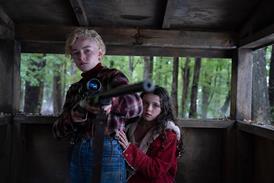
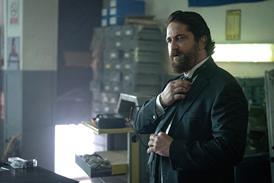




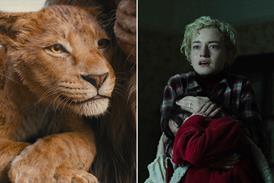

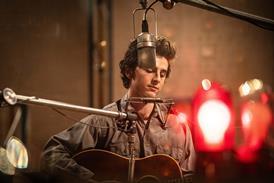
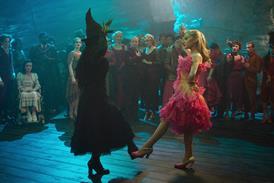
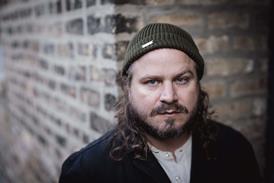




No comments yet